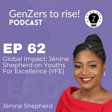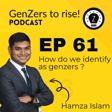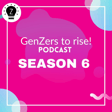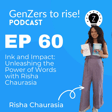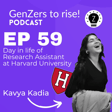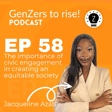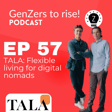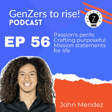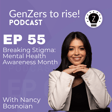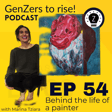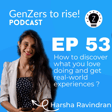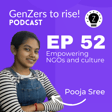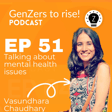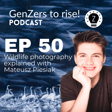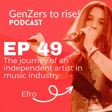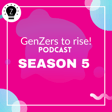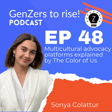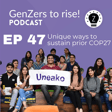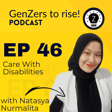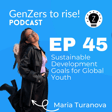Introduction to Changemaker-Z
00:00:01
Speaker
Hello everyone, I'm Kennedy. And I'm Vassilis. We run Changemaker-Z, a student-run initiative that aims to empower, educate, and connect Gen Zers interested in entrepreneurship. We interview teenagers with impactful projects and create resources to help you change the world. If they can't do it, so can you.
00:00:23
Speaker
On this podcast, we discuss the logistics of creating different types of projects with Jin Ziers who have already done it. We will leave our social media and website information in the description.
Jessica Kim's Journey and Book
00:00:44
Speaker
Hi, Changemakers. Today, we are here with Jessica Kim. Jessica is a disabled poet, activist, and founder of I Create Youth, which is an organization that empowers disabled youth through language in its various forms. In March 2020, she started writing poetry in response to a frightening world that has since been named the 2021 Los Angeles Youth Poet Laureate and 2022 National Youth Poet Laureate Runner Up. In April of this year, her book of poems
00:01:13
Speaker
Light, which is centered on her visual impairment and Korean American experiences, was published by Animal Heart Press. Jessica believes in advocating for disabled youth by inspiring them to share their stories through various forms of language from creative writing to computer programming. By initiating and directing programs at I Create Youth, she hopes to educate students and the general public on disability justice and representation.
00:01:36
Speaker
Jessica has a very global mindset, having lived in multiple parts of the United States, South Korea and Singapore.
Discovering Poetry in the Pandemic
00:01:43
Speaker
Welcome to the show, Jessica. Hi, it's nice to be here. Thank you. We're so excited to have you. Nice to meet you. So before we start, every time we ask, like, where did your love for writing and poetry come from?
00:02:02
Speaker
Yeah so I started writing during the pandemic which isn't too long ago but I think this kind of
00:02:12
Speaker
This kind of place where I had to be all alone, be constantly examining myself kind of forced me to find a creative medium to out pour my emotions. So poetry was kind of the perfect medium for me because it started just on a notebook where I could just write down like small observations and things that I love.
00:02:40
Speaker
So that's kind of where my poetry started and I quickly found a community of young writers and young activists who believed in poetry as a means of social justice and a means of catharsis and that
00:03:01
Speaker
really empowered me to continue with writing. And I've been honored to be the Los Angeles Youth Poet Laureate and also one of the National Youth Poet Laureate finalists, which really helped ground that sense of community that I saw in poetry. And that's why I'm still writing poetry. That's amazing. I mean, would you say that English was always your favorite class or something like that?
00:03:32
Speaker
Actually, not really. I really loved math as a kid. My parents were both my father's an architect and my mother was a math teacher.
From STEM to Poetry Passion
00:03:43
Speaker
So I grew up in a really like STEM focused environment and no one really expected me to start writing, but I think, and I also considered myself more of a STEM person, but I think
00:03:57
Speaker
maybe something just clicked over the pandemic and I'm still figuring out why but I kind of found that transition from STEM to English really gratifying and also English wasn't always my first language. I grew up, I still speak Korean at home and I grew up speaking Korean at home
00:04:20
Speaker
So I think I had my fair share of not really understanding English, struggling to keep up with English classes, but I ultimately found a way to appreciate English. And now I think English is definitely one of my favorite subjects in school. That's amazing. And it's so incredible that you're able to win that. I don't think I was pronouncing it right, Laureate. Yeah, that's right.
00:04:50
Speaker
That makes it even more incredible. And I'm glad that kind of makes sense about the STEM thing that I'm actually going to ask you. The next question was, when IC started, which is the acronym for I Create Youth, IC started, it mainly focused on writing. Why did you decide to expand it to where it is today? So I Create Youth was founded in June 2020, which was
00:05:14
Speaker
three months into the pandemic.
Founding I Create Youth
00:05:16
Speaker
And I felt that even before that youth with disabilities were othered by their communities and classmates, but that was even more heightened during the pandemic because of the isolation that we faced. So I felt so disconnected from my support systems and I'm sure that many other disabled youth felt the same way. So I wanted to create a platform
00:05:43
Speaker
that can unite disabled students. And that was through writing because I thought a form of storytelling using creative writing, using poetry was a way to shed light on the experience of disabled youth. And so I started by offering educational opportunities online and creating syllabi for creative writing classes.
00:06:12
Speaker
um to for youth to share their celebrations and struggles in a very realistic and authentic way but we actually shifted and expanded to to accommodate more forms of it's more
00:06:29
Speaker
sectors where youth are involved and where disabled youth need more representation. And as a kind of well-rounded student who's interested in both writing and also STEM and like computer programming, I decided to expand. So we empower and educate and connect disabled youth through language in its various forms. And that means anything from
00:06:58
Speaker
all different kinds of languages, so kind of like an international background to poetry and computer programming. So iCreateYouth has kind of worked with that expanded perspective and a lot of our initiatives tackle that all around kind of global approach.
Media Representation and Disability
00:07:21
Speaker
This is so interesting, so amazing.
00:07:25
Speaker
As someone who was born with a visual impairment, how do you feel about representation in the media for disabled folks?
00:07:37
Speaker
Because I was born with a visual impairment, I grew up really isolated and I grew up trying to revert attention away from myself. I remember getting ready in the morning for school even as early as kindergarten meant spending an hour each morning trying to wear contact lenses.
00:07:59
Speaker
And even at school, I was constantly looking down because I didn't want other people to notice like my shaky eyes and that kind of made me very scared and withdrawn. And so I think sometimes media really reflects that kind of stigma that disabled people are always kind of weird or different.
00:08:29
Speaker
And in kind of a negative light, I think many, many like shows or even like news outlets kind of portray disabled people as someone who's less than and less than, I guess, normal people. And other than that, I also do think that media in general kind of
00:08:56
Speaker
I guess looks overlooks disabled people in the sense that they're not as represented as they should be around especially after like the pandemic around 25% of people identify as disabled yet we barely see any stories representing disabled people and I hope to change that and I hope that can be changed.
00:09:23
Speaker
Yeah, I definitely like agree because when I think of media like featuring disabled stories or anything, like the only one that I can really think of is like switch to birth, which like talks about the deaf community. I don't know if you guys have watched that show, but yeah, it's just, it's really not enough. And especially I don't, I really don't see a lot about visual impairment, blindness, or even like, you know,
00:09:52
Speaker
illnesses that aren't that you can't see, you know, so I hope that starts to change. Right. So I wanted to ask, you know, how do you think we can educate ourselves and, you know, support our disabled friends and family?
Importance of Disability Education
00:10:10
Speaker
Yeah, so I guess the first step of education is raising awareness and research. So
00:10:21
Speaker
So July is actually Disability Pride Month and that's a really perfect opportunity for people to learn about disability through
00:10:34
Speaker
infographics on social media, news articles, or even informational articles online. And I think it's very important to do that background research and also consult people and friends who identify as being disabled to share their stories and to kind of personalize their stories. And after
00:11:00
Speaker
you educate yourself. It's important to spread that information to your loved ones, your friends and family, and I think that can be done through so many ways. With the accessibility of technology, we can always share links or social media posts, and even small acts like those can
00:11:25
Speaker
go a long way, especially because not everyone is familiar with even like the basis of disability. And I think July would be the perfect opportunity to start that. Yeah, we actually like at my college, Tan France, if anyone knows Tan France, he's a host of Queer Eye. He came and people were like,
00:11:54
Speaker
He just asked a question about spreading a message. He was like, I swear to you guys, you guys have more like power to spread a message with your friends and family than I do with like a huge platform because we actually have an active audience, you know, other like versus like someone, you know, cause you always think, Oh, I can't really make a change, but you don't know. It's kind of like a domino effect. You know, you could talk to your family about it and you don't know how many people could spread to. They could talk to someone else. So definitely.
00:12:22
Speaker
Or there are some times where you don't even know how many people are impacted from the same. No problem when people do not understand like the difference, the disabilities that they may have. I would like to ask, I see why has a fellowship program? What is it and how can we get involved?
Youth Empowerment Fellowship Program
00:12:42
Speaker
So iCreateYouth started a fellowship program last year, which was originally only
00:12:52
Speaker
exploring, I guess, tracks in art. So we had a writing track, we had a kind of advocacy track, an artistic track where people could design like posters and graphics, and a research track involving the intersections of disability and writing or various forms of art. And that
00:13:18
Speaker
program was an initiative where staff from iCreate Youth would be paired with fellows and our staff would I guess mentor and advise the fellows on creating a research project of some sort. So last year we had research projects on
00:13:42
Speaker
eco-ableism and also research projects on chronic illness, on representation of disability in literature, and that kind of culminated into an online showcase that's available on our website. This year we brought the fellowship program back again for its second time and I hope to make this a continuous annual event.
00:14:14
Speaker
For this year, we actually expanded in accordance with our mission to include both the STEM fields and art fields. So this year we focused a lot on technology and one fellow created an accessible Chrome extension. Other fellows explored a hybrid between technology and the arts. Other fellows also explored
00:14:43
Speaker
like a representation of women with disabilities in literature. And so we had a lot of diversity in projects. And to get involved, we usually open applications in January and even December and we kick start the program.
00:15:03
Speaker
in February, so youth aged anywhere from 13 to 22 can look forward to joining the fellowship program. And in 2023, we might even open opportunities to join as a mentor instead of a fellow. So that's kind of where I'm going with that program.
00:15:28
Speaker
Oh, that sounds really exciting. And you said it was age, you said it was age 13 to 22. Yeah. So there's still like a lot of it's not just a high school thing. So college students who can get involved as well. Right. And I heard like one of the like one of the cool things that was mentioned was like a more accessible Chrome extension. I was well I was like looking at your site and like one of the things I noticed it was
00:15:58
Speaker
saying it was kind of being developed to be more accessible. So what would an accessible site look like for visually impaired? Yeah, so accessibility comes in kind of, I guess, kind of like a color scheme wise component and also as like including alt text for visually impaired people and blind people to
00:16:27
Speaker
understand what the images mean for those who can't see them. So first, for the color scheme, it's important to contrast the text color and the background color with the image color and the background color. So I've been working a lot to
00:16:47
Speaker
is kind of reorientate iCreateYouth's color scheme in terms of formatting the website so that we always have a brighter background paired with dark text and darker backgrounds paired with white or very light colored text.
00:17:05
Speaker
um that's always a work in progress for us and the other important thing is including alt text um so usually on most websites there is always like an option to
00:17:22
Speaker
include alt text for all your images whether it be like on Instagram or on a website and you can also do this if you're using like if you're coding your website by yourself but yeah so it's important to use like image descriptions whether it's like a person then you would describe maybe their facial features and the shirt they're wearing or
00:17:47
Speaker
what their hair looks like, that kind of details that helps visualize the image for someone who isn't able to see it. So that's also a point of accessibility that we're working on. That's just one of the things that I've never thought about before. It's more things that it shouldn't just be your side.
00:18:16
Speaker
everybody should, you know, maybe it would be great if everyone started taking consideration like making it more accessible, making their sites. But also, we heard some great things about the fellowship program. What about the summer research scholar program?
Mentorship and Research Projects
00:18:34
Speaker
Tell me more about that. Yeah, so the research scholars program is
00:18:41
Speaker
sort of an extension and reimagination of the fellowship program because I thought it was really important to offer more opportunities, especially over the summer where people usually have more time at their hands. So I'm
00:19:02
Speaker
in the middle of directing the research program and it's our first year of starting it. And this program pairs young scholars with more experienced research mentors who are also like youth, usually like high school seniors or college students. So
00:19:26
Speaker
They we accepted applications for both scholars and mentors so that we could pair them according to whether they're interested in like neuroscience or psychology or biology and that kind of diversity. We saw a lot of diversity in interests and I'm using that diversity to
00:19:54
Speaker
for each scholar to work on a six-week research project where the end product is either a paper or a presentation or some kind of posters slash graphic. And they're working one-on-one with a mentor to develop that project. And we are hoping to incorporate
00:20:20
Speaker
a lot of disability components, whether it be just thinking about accessibility or extending their projects into a realm that includes disability representation. So it's the first time I'm doing this for the Summer Research Scholars Program, but I'm really glad to see the progress that we're making and also really excited for our final outcome.
00:20:51
Speaker
So we're wishing you the best for this new program. Now on your website, we have seen several letters that have been sent. So do you have any favorite letters for disabled students? Yeah, so letters for disabled students was a project that kind of, it's still ongoing, but it was
00:21:17
Speaker
more so when I first started I create youth and I saw a lot of contributions from from both people we reached out to on social media and also from our own staff and I think every letter in the gallery is very it's very unique and also very supportive in a way and I think
00:21:48
Speaker
especially the ones where youth, fellow youth try to reimagine disability in a sense that they say maybe disability is never an inability or disability will keep you going, so never give up. And I find that really encouraging. Also, letters where people acknowledge that
00:22:16
Speaker
They, as a non-disabled person, will never be able to fully understand their disabled person's experience, but we still support and encourage you. I find that very valid and also meaningful. I was reading through some of the letters and I thought they're really, like, I can see where I was aspiring. Like, I was also looking at them, like some of the ones that stuck out to me was like, um,
00:22:42
Speaker
different, like abled, not disabled, stuff like that. So this was just nice reminders to keep around, I feel like. Yeah. Don't forget that any length, any topic, just words of encouragement, everyone and anyone is welcome to leave a letter. So you can find the link in the description to send through a letter. Like, review. Yes, you can. You guys also offer some exhibitions
00:23:12
Speaker
You were wondering if you have any new, if you're designing any new exhibitions or anything like that?
Exhibition of Disabled Changemakers
00:23:19
Speaker
Yeah, so actually for July, since it's Disability Pride Month, I plan to showcase an exhibition of disabled people like all over the world and across all different spectrums. So I'm planning to do
00:23:39
Speaker
both research and also reach out to disabled change makers like live so that we can do an interview either through like a written form or through a recording of it or a combination of both. And I am planning to showcase that around maybe like the
00:24:07
Speaker
end of July where kind of Disability Pride Month is at its culmination. And so you can look forward to that. Yeah. And for, you know, you might have gotten already, but you know, for people who don't know the exhibitions, it just features disabled, like people who have change makers who have made an impact on who may be disabled or who change beyond disability. Is that right? Yeah.
00:24:37
Speaker
So that's exciting. That's really, really exciting.
Conclusion and Social Media
00:24:41
Speaker
I think that this is all for today's episode. Thank you, Jessica, for joining us and sharing about iCreateYouth. Thank you so much for having me. It's been a great pleasure talking to you. Thank you so much. If you'd like to keep up with ICY, you can follow them on Instagram, Facebook, and Twitter. We'll link in at iCreateYouth. Don't forget to follow us at gender2rise on Instagram. And until next time.
00:25:07
Speaker
Don't forget to change the rules. Bye. Thank you guys for listening. We hope you enjoyed the conversation. We had such a great time. Make sure to leave us a review. If you want more Changemakers content, you can follow us on Instagram at JinZearsToRise and on Facebook at ChangemakersE.

